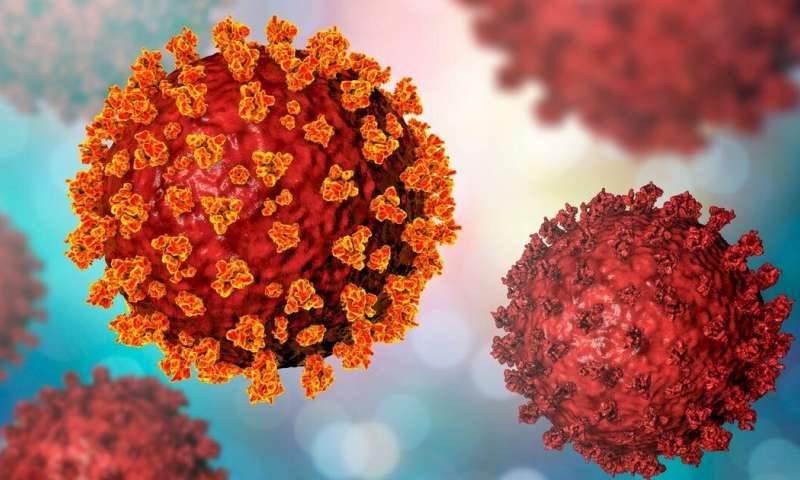Among the casualties of the COVID19 epidemic, one that’s not immediately obvious is biomedical research not directly related to the pandemic and SARS-CoV-2.
This picture emerges in detail from a new study of researchers at the IMT School for Advanced Studies Lucca on PLOS One. Analyzing the publications that appeared on PubMed between the beginning of 2018 and the end of 2020, the authors have shown that COVID-19 acted as a powerful and unpredictable shock, profoundly affecting and shifting priorities of the scientific production in the biomedical field. While publications related to all the aspects of the pandemic skyrocketed—thanks to the commitment of the scientific community, which brought in a short period a surge of knowledge about the new coronavirus—publications, clinical trials, and grants in subjects not directly related to COVID decreased of up to 25 percent compared to the pre-COVID era, a fact non immediately evident and not without consequences.
To conduct their analysis, Massimo Riccaboni, professor of Economics at the IMT School, and Luca Verginer, now post-doc at the ETH Zürich, considered the PubMed repository, which contains more than 34 million biomedical citations annotated with the Medical Subject Headings (MeSH) terminology. MeSH are keywords manually assigned to the articles that allow to classify them based on their content. Then the authors introduced an index of relatedness to COVID-19 to measure how closely-related a term is to the pandemic—for example, “ageusia,” loss of taste, a medical term existing since 1991, became known as a specific symptom of COVID-19, so it is highly related—and compared scientific articles listing COVID-related Medical Subject Headings (MeSH) and COVID-unrelated MeSH.
From this analysis, some data clearly emerged. First of all, as expected, it was evident that the scientific community immediately mobilized to produce research on COVID-19. In the first three months after the pandemic, the number of scientific papers about COVID-19 was fivefold the number of articles on H1N1 swine influenza. The term “Betacoronavirus’ (SARS-CoV-2 is a species of the genus) skyrocketed from 2019 to 2020: the number of publications weighted by their impact factor increased by up to a factor of 100 compared to the previous. At the same time, the term “Alphacoronavirus’—a different genus—did not experience any growth. For the period considered, all the research themes in some way related to COVID—even those very rarely considered before, such as “quarantine” and “lockdown”—exploded. The term “ageusia” was the subject of 176 articles in 2020. Similarly, the number of clinical trials related to COVID-19 prophylaxis and treatments significantly increased.
Much less noticeable and expected was what happened to the fields of biomedical research non-related to COVID-19. In this case, the authors observed a very significant reduction in publications, with medical terms not related to COVID appearing less and less frequently in the scientific literature. For the least related group, decreases in the number of publications was between 10 percent and 13 percent, and the drop in the impact factor weighted output reached almost 20 percent. The number of clinical trial publications in the least related group dropped by a staggering 24 percent. At the same time, publications on clinical trials for COVID-19-related MeSH increased by a factor of 2.1 Another effect emerged from the analysis: grants assigned in the pre-COVID era, already mentioned in 2018, were diverted to support COVID-19 related research, as it emerges from the number of publications linked to those grants.
This phenomenon, already shown by other studies, has been called “COVIDisation” of academic research. The IMT School analysis reveals the magnitude and proportions of this shift. “The overall picture that emerges is that there has been a profound realignment of priorities and research efforts, with the entire medicine focused on COVID-19,” says Riccaboni. “While this effort and the mobilization of the scientific community brought us vaccines, this shift in fact also displaced biomedical research in the fields not related to COVID-19, bringing other undesired consequences.” The phenomenon addressed in the study adds up to other relevant changes induced by the pandemic in the scientific research, such as the record number of studies suspended, the toll on women and early-career scientists, the questionable quality of methods and data gathered in clinical trials produced through fast-tracks. “It is important to point also these negative consequences, so to avoid for the future that research for diseases other than COVID-19, such as rare diseases, are further neglected,” says Riccaboni.
IMT School for Advanced Studies Lucca


